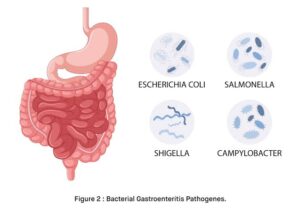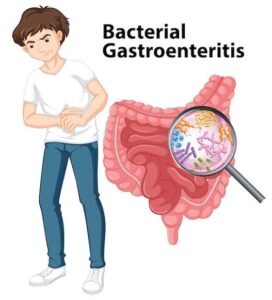Back to: MICROBIOLOGY 300 LEVEL
Welcome to class!
It’s a joy to have you back again! Today, we’re looking at a group of bacteria that cause some of the most common and dangerous food and water-related diseases, especially in communities across Nigeria and Africa. We’re talking about Escherichia coli, Salmonella, Shigella, and Vibrio cholerae. These names may sound complex, but their effects are very real—from food poisoning after roadside meals to outbreaks of cholera in flood-prone areas. Let’s break it down in a way that makes sense to you.
Escherichia Coli, Salmonella, Shigella, Vibrio Cholerae
Escherichia coli (E. coli)
This is a Gram-negative rod-shaped bacterium found mostly in the intestines of humans and animals. Most strains are harmless, but some can cause serious illness.

Harmful Strains:
Enterohaemorrhagic E. coli (EHEC) like O157:H7 causes severe diarrhoea and may lead to kidney damage in some people.
Transmission:
Through contaminated food (like undercooked suya or improperly washed vegetables), water, or direct contact with animal faeces.
Symptoms:
Diarrhoea (sometimes bloody), stomach cramps, nausea, vomiting, and fatigue.
Prevention:
Safe food handling, good personal hygiene, and proper cooking of meat.
Imagine a student at a university in Port Harcourt who buys salad from a street vendor without knowing the vegetables weren’t washed properly. He falls ill that evening—this could be an E. coli infection.
Salmonella
Another Gram-negative rod, Salmonella is known for causing typhoid fever and gastroenteritis.
Sources:
Contaminated water, food (especially poultry, eggs), or poor sanitation.
Diseases Caused:
Salmonella Typhi: Typhoid fever—common in areas with poor water treatment.
Non-typhoidal Salmonella: Causes food poisoning.
Symptoms:
Fever, abdominal pain, diarrhoea or constipation, and weakness.
Prevention:
Clean drinking water, vaccination, and good food hygiene.
Think about the rainy season in a community with open gutters and contaminated boreholes. Typhoid fever cases usually rise in such environments.
Shigella
This bacterium causes shigellosis—a type of bacterial dysentery.
Transmission:
Faeco-oral route, especially in overcrowded places like IDP camps or schools with poor toilet facilities.
Symptoms:
Bloody diarrhoea, fever, abdominal cramps, and nausea.
Why It’s Serious:
It spreads easily and requires only a few bacteria to cause illness.
Prevention:
Handwashing, safe water, and sanitation.
Imagine a boarding school in Ogun State where students share one bucket of water to wash hands after using the toilet. If one student has shigellosis, it can spread rapidly.
Vibrio cholerae
This is the bacterium behind cholera, a severe diarrhoeal disease that can cause death within hours if not treated.

Transmission:
Drinking water or eating food contaminated with faeces containing the bacteria.
Symptoms:
Profuse, watery diarrhoea (often described as “rice water”), vomiting, rapid dehydration, and low blood pressure.
Why It’s Deadly:
Dehydration can lead to shock and death very quickly, especially in children and the elderly.
Prevention:
Clean water supply, proper waste disposal, cholera vaccines, and rehydration.
Picture a flood-hit area in Bayelsa with no clean water supply. Cholera outbreaks become a real risk, and swift public health response is key.
Summary
- E. coli can cause diarrhoea from contaminated food and water.
- Salmonella leads to typhoid and food poisoning, especially from unsafe water and poultry.
- Shigella spreads in overcrowded, unhygienic settings and causes bloody diarrhoea.
- Vibrio cholerae causes deadly cholera, especially in emergencies with poor water and sanitation.
Evaluation
- What are the two major diseases caused by different strains of Salmonella?
- How is Shigella primarily transmitted?
- Why is Vibrio cholerae considered a public health emergency?
You’re not just learning facts—you’re gaining the power to make a real difference. Whether it’s preventing an outbreak or advising a family, your knowledge is a tool for change. Stay focused, stay curious, and always remember: Afrilearn is here to walk this journey with you. See you next class!
